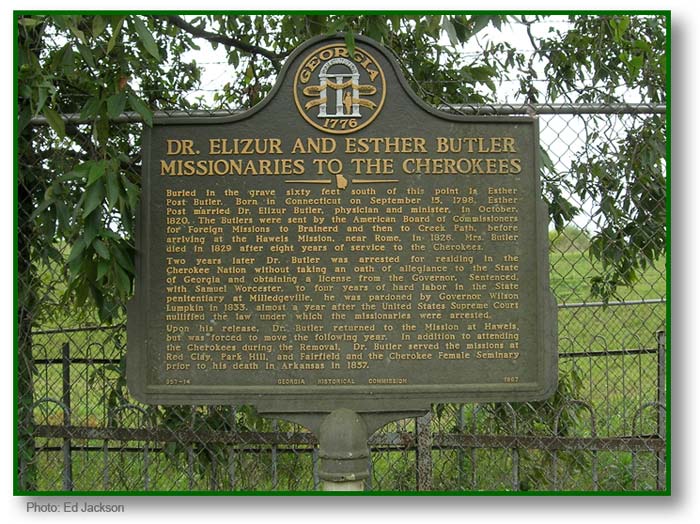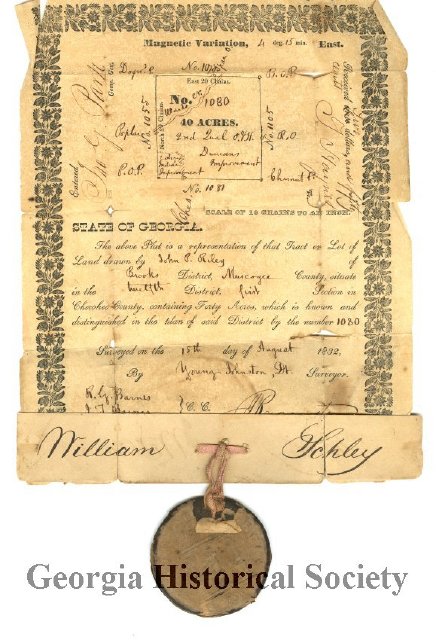To further explore this year’s Georgia History Festival theme, “The United States Constitution: Ensuring Liberty and Justice for All,” January’s #MarkerMondays explore themes from Article VI of the U.S. Constitution, specifically how Georgians have regarded the Supremacy Clause and/or the Oath or Affirmation Clause.

This week’s #MarkerMonday highlights Dr. Elizur Butler and Samuel Worcester, and discusses Georgia’s reaction to the Supreme Court ruling in Worcester v. Georgia. Dr. Butler and Mr. Worcester were both missionaries working under the American Board of Commissioners for Foreign Missions who also provided legal and political advice to the Cherokee Nation in the 1820s and 30s as Georgia waged a campaign for the removal of all Native Americans from within the State’s claimed borders. During this time, the State of Georgia passed laws that abolished the Cherokee government, annexed Cherokee land (which they redistributed to white settlers), and prohibited white persons from residing with the Cherokee. Dr. Butler and Mr. Worcester refused to abide by the latter law and were sentenced on September 15, 1831 to four years at the State penitentiary in Milledgeville.

In 1832, Samuel Worcester challenged the Georgia laws in the Supreme Court Case Worcester v. Georgia. On March 3, 1832, in a five to one decision by the Supreme Court, Worcester won his case and Chief Justice John Marshall concluded in the court’s opinion that the “Cherokee Nation… is a distinct community occupying its own territory… in which the laws of Georgia can have no force.”
The State of Georgia ignored the Supreme Court ruling, which was a significant test to Article VI of the U.S. Constitution, in which the Supremacy Clause mandates that federal laws and treaties, like those that Georgia’s laws violated, are paramount to the laws of state governments. President Andrew Jackson, however, did not act to enforce the ruling, and later remarked: “The decision of the supreme court has fell still born, and they find that it cannot coerce Georgia to yield to its mandate.” In 1838, U.S. troops began removing Cherokees in what became known as the Trail of Tears.
Explore the links below to learn more about Elizur Butler, Samuel Worcester, and the Supreme Court Case Worcester v. Georgia.
Today in Georgia History “Worcester v. Georgia”
New Georgia Encyclopedia “Worcester v. Georgia (1832)”
Encyclopedia Britannica “Worcester v. Georgia”
Constitution Center: Article VI “Debts, Supremacy, Oaths, Religious Tests”
Cherokee Nationalism and New Echota
A History of the Supreme Court
GHS houses several collections related to Worcester v. Georgia and the forced removal of the Cherokee Nation from Georgia.
The removal of the Cherokee Indians from Georgia / by Wilson Lumpkin ; including his speeches in the United States Congress on the Indian question, as representative and senator of Georgia ; his official correspondence on the removal of the Cherokees during his two terms as governor of Georgia, and later as United States commissioner to the Cherokees, 1827-1841 ; together with a sketch of his life and conduct while holding many public offices under the government of Georgia and the United States, prior to 1827, and after 1841.
Cherokee Indians relocation papers, 1815-1838.
Removal of the Cherokees : letter from the Secretary of War, transmitting copies of the correspondence between the War Department and Major General Scott, in relation to the removal of the Cherokees.
The Georgia Historical Quarterly published articles related to Dr. Elizur Butler and Worcester v. Georgia which can be accessed on JSTOR. If your library does not have access to JSTOR, you can go to www.jstor.org and create a free MyJSTOR Account.
Georgia and the Conversation over Indian Removal
The Cherokee Indians and the Supreme Court
